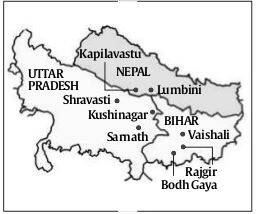Indian Heritage & Culture
Kushinagar International Airport
- 20 Oct 2021
- 6 min read
Why in News
The Kushinagar Airport in Uttar Pradesh is the latest entrant in India's list of international Airports. The airport is expected to provide seamless connectivity to people from South east and East Asian countries for Buddhist Pilgrimage Tourism.
- Kushinagar is the centre of the Buddhist circuit, which consists of pilgrimage sites at Lumbini, Sarnath, Gaya and others.
Key Points
- Kushinagar Airport and Cultural Diplomacy:
- The inauguration of Kushinagar International airport is set to be a landmark in the India-Sri Lanka relations.
- On the occasion of Aiprort’s inauguration, Sri Lanka will present to India photographs of two mural paintings:
- One Mural Painting shows Arahat Bhikkhu’ Mahinda, son of Emperor Ashoka delivering the message of the Buddha to King Devanampiyatissa of Sri Lanka.
- The other shows the arrival of ‘Theri Bhikkhuni’ Sanghamitta, the daughter of the Emperor, in Sri Lanka, bearing a sapling of the ‘sacred Bodhi tree’ under which Siddhārtha Gautama is believed to have attained enlightenment.
- The Buddhist circuit reflects the use of soft power in India's foreign policy.
- The emphasis on Buddhist diplomacy, will help counter increasing Chinese influence in Sri Lanka and improve people to people relations (especially in the context of the aftermath of Sri-lankan Civil War).
- Further, the Buddhist faith, due to its emphasis on peaceful co-existence and its wide pan-Asian presence, lends itself well to soft-power diplomacy.
Spread of Buddhism in Sri Lanka
- Buddhism was first brought to Sri Lanka by a mission sent out from eastern India during the reign of the Mauryan emperor Ashoka (c. 273–232 BCE).
- The leader of the mission to Sri Lanka, Mahendra (Mahinda), is described as Ashoka’s son.
- About Buddhist Circuit:
- In 2014-15, the Ministry of Tourism launched the Swadesh Darshan scheme with a vision to develop theme-based tourist circuits on the principles of high tourist value.
- The Ministry has identified Buddhist Circuit as one of the fifteen thematic circuits for development under the scheme.
- The Buddhist circuit is a route that follows in the footsteps of the Buddha from Lumbini in Nepal to Kushinagar in Uttar Pradesh in India, where he died.
- Buddhist pilgrims consider Kushinagar a sacred site where, they believe, Gautama Buddha delivered his last sermon and attained ‘Mahaparinirvana’ or salvation.
- Investing in the Buddhist Circuit is the result of first-time collaboration between the Government of India’s Ministry of Tourism, the State Governments of Bihar and Uttar Pradesh, the private sector, Buddhist monasteries and sects, and the World Bank Group.
- In 2014-15, the Ministry of Tourism launched the Swadesh Darshan scheme with a vision to develop theme-based tourist circuits on the principles of high tourist value.
Buddhist Circuit
- Other Initiatives Taken to Promote Buddhist Sites:
- PRASHAD Scheme: 30 projects for development of infrastructure have been undertaken under the PRASHAD Scheme.
- Iconic Tourist Sites: Buddhist Sites at Bodhgaya, Ajanta & Ellora have been identified to be developed as Iconic Tourist Sites.
- Buddhist Conclave: It is organised every alternate year with the objective of promoting India as a Buddhist Destination and major markets around the globe.
- Diversity of Languages: Signages have been installed in Chinese language at buddhist monuments in Uttar Pradesh and in Sinhala language (official language of Sri Lanka) at Sanchi monuments in Madhya Pradesh.
Buddha Path
- Buddha was born in 563 BC at Lumbini, in Nepal.
- He preached that one should avoid the excess of both luxury and austerity. He advocated the “madhyam marg” (middle path).
- The eight-fold path (extraorbdinary Teachings of the Buddha) comprised the following:
- Right view.
- Right resource.
- Right speech.
- Right conduct.
- Right livelihood.
- Right effort.
- Right mindfulness.
- Right concentration.
- The ‘Buddha Path’ also refers to the Eight Great Places of Buddhist Heritage (referred in Pali as Aṭṭhamahāṭhānāni). They are:
- Lumbini (Nepal)- Buddha was born.
- Bodh Gaya (Bihar)- Attained enlightenment.
- Sarnath (Varanasi, U.P.)- First sermon.
- Kushinagar (Gorakhpur, U.P.)- Buddha died.
- Rajgir (Bihar)- Where the Lord tamed a mad elephant.
- Vaishali (Bihar)- Where a monkey offered honey to him.
- Sravasti (U.P)- The Lord took his seat on a thousand petaled lotus and created multiple representations of himself.
- Sankasya (Farrukhabad, Uttar Pradesh)- He descended from heaven.





